At Pittsburgh Seminary, we seek to participate in God’s ongoing mission in the world by seeing and getting to know people as our neighbors. Challenged by Jesus’ parable of the Good Samaritan and inspired by “Mister” Fred Rogers ’62, who sang, “I have always wanted to have a neighbor just like you,” I am writing to introduce you to some of my neighbors, whom I want you to know. Today, I’d like to introduce you to my neighbor Antonio M. K. Lawrence.
Antonio serves as pastor of Faith Presbyterian Church in Goldsboro, N.C. He was born in Rocky Mount, N.C., to Rev. Antonio and Freeda C. Lawrence. He pastors the church where his father previously pastored and his mother was and still is a pillar of the church. Antonio has a charismatic personality and is a good storyteller. He loves being with people, and his sense of call is to provide a voice to the people who have no voice, providing hope to people who are trying to find hope. Antonio lives out his call as a bi-vocational pastor, serving as a behavior specialist in Goldsboro High School, where he referees sports, helps students with career planning, and sometimes just helps students get through the day by holding them as they cry. He says that he just wants to be a great disciple of Jesus, the carpenter. He is grateful for the Doctor of Ministry Program at Pittsburgh Theological Seminary as it has given him new tools for ministry in caring for his neighbors.
– The Rev. Dr. Donna Giver-Johnston, Director of the Doctor of Ministry Program at Pittsburgh Theological Seminary
Who is my Neighbor: The Community is My Neighborhood

“Who is my neighbor” is the fundamental question that everyone who considers themselves a follower of the carpenter from Nazareth must be willing to sit with daily. Consistently, we should take the opportunity to wrestle with the powerful commandment from Matthew 22:35-40, in which we are told to love the Lord our God with our heart, mind, and soul; and our neighbor as ourselves. Naming and defining who our neighbor is must be one of the most complicated things that we are called to do as Christians.
Defining our neighbor makes us cross the very boundaries that we have established to keep us from being in the neighborhood with anyone else. When we invest in property, it is because of the neighborhood. We choose the schools our children will attend based upon the neighborhood. We even prejudge the churches we attend based upon what the neighborhood looks like. With all these choices we have when comes to our neighborhood, I am reminded that we are not allowed to choose who our neighbor is.
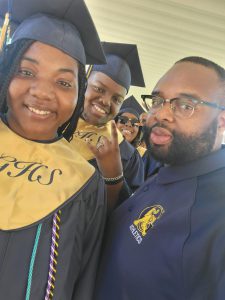
When I look at the life I have been called to as a bi-vocational pastor in the South, I have embraced the philosophy that the community is my neighborhood. Growing up as a child who appreciated public television, Mr. Rogers’ Neighborhood was a conversation launching pad for what it meant to make the community your pulpit. In a time where the post-pandemic pastor is reimagining what it means to be the church, it is no longer from inside the safety of the walls, but in the public square. A bi-vocational pastor lives a life where calling and career remain at the intersection of the life they live. My neighbor is not just connected to the work that is done in the church; it is a work that is extended into the community. Daily with my career and calling, I do a dance between life as Rev. Lawrence of Faith Presbyterian Church and Mr. Lawrence of Goldsboro High School. Daily I find myself embracing the people in the neighborhood because the neighborhood has embraced me.
According to Robert Michael Franklin Jr. in his work Crisis in the Village: Restoring Hope in African American Communities, the church and the school are considered anchor institutions in society. These are institutions that have an enduring presence and operate to stabilize people amidst chaos and rapid transition.[1] My role and responsibility to the best of my ability as Rev. Lawrence and as Mr. Lawrence is to provide hope and stability to people who might not know what that reality looks like. My neighbor often makes me confront my privilege and extend that privilege to help them obtain opportunities that they might not have access to. The beauty of seeing the neighborhood evolve into this allows us to embrace a responsibility to be prophetic problem solvers.
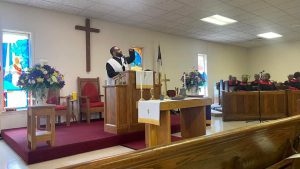
When we become prophetic problem solvers, we become connected with our neighbors for the greater works in society. My neighbor is my conspirator in the struggle to ensure that the world is true to what we say on paper. My neighbor in the community has reminded me of the powerful responsibility of partnerships. Krin Van Tatenhove and Robert Muller believe that partnership always transforms us, shaping our character, our spirits, and our actions.[2]
After almost a decade of ministry in Eastern North Carolina, I can admit that I have learned more from my neighbor than I knew when I first arrived. My life is better because of the community I have formed in my neighborhood. If I am asked to define who my neighbor really is, I could give a litany of possible answers. My neighbor lives at the intersection of the Washington and Dubois debate. My neighbor is the one fighting for a living wage and the one living their best life. My neighbor is churched and unchurched. My neighbor is the one who helps confront the issues of the world, so that we can have a beautiful day in the neighborhood.
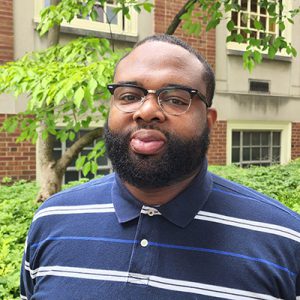 The Rev. Antonio Lawrence is a student in the Intergenerational Black Church Studies cohort of the Doctor of Ministry Program at Pittsburgh Theological Seminary. He is the pastor of Faith Presbyterian Church (Goldsboro, N.C.) and a behavior specialist in Goldsboro High School who feels called to provide a voice to the people who have no voice and provide hope to people who are trying to find hope. He works with a feeding program for the community that partners with high schools in rural and inner city gang-heavy areas to provide food. Rev. Lawrence holds an M.Div. from Princeton Theological Seminary and is an ordained minister of Word and Sacrament in the PC(USA).
The Rev. Antonio Lawrence is a student in the Intergenerational Black Church Studies cohort of the Doctor of Ministry Program at Pittsburgh Theological Seminary. He is the pastor of Faith Presbyterian Church (Goldsboro, N.C.) and a behavior specialist in Goldsboro High School who feels called to provide a voice to the people who have no voice and provide hope to people who are trying to find hope. He works with a feeding program for the community that partners with high schools in rural and inner city gang-heavy areas to provide food. Rev. Lawrence holds an M.Div. from Princeton Theological Seminary and is an ordained minister of Word and Sacrament in the PC(USA).
References:
[1] Franklin, Robert M. Crisis in the Village: Restoring Hope in African American Communities. Fortress Press: Minneapolis. 2007. p.4
[2]Tatenhove, Krin Van and Muller, Rob. Neighborhood Church: Transforming Your Congregation into a Powerhouse for Mission. Louisville, KY: Westminster John Knox, 2019. p. 50
Read Next
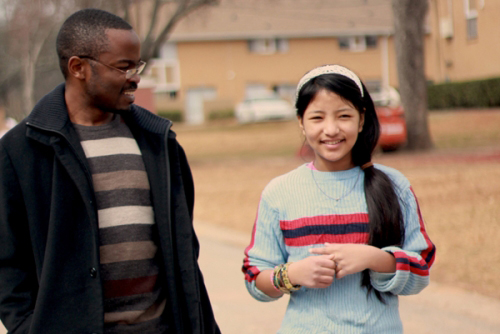
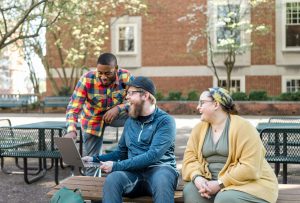
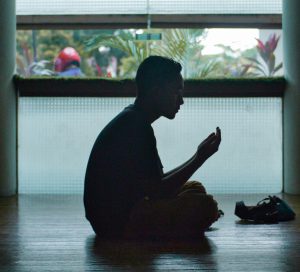


1 thought on “Who Is My Neighbor? – The Rev. Antonio Lawrence on Prophetic Problem Solving and Bi-Vocational Ministry”